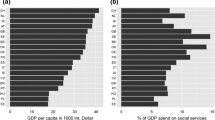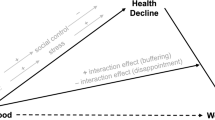Abstract
The aim of this paper is to investigate the impact of an extended lifespan of parents on middle-aged women and men from a demographic, sociological and psychological perspective. Based on Swiss data, three main research questions are investigated and discussed in three different sections: (a) How far has the common lifespan of children and parents been extended and how does it affect kinship structures? (b) How accurate is the term of “sandwich generation” in this context? (c) Which are the psychological concomitants—in terms of filial maturity—of being reinvolved with one’s old parents in mid-life? The demographic analyses illustrate a considerable extension of common lifespan of children and parents. Combined with low fertility rates this results in rapidly increasing parent-support ratios. A sociological approach analysing the concept of “sandwich generation” indicates that, for women, a new kind of double burden (professional work and family care) is more widespread than being ‘sandwiched’ between the youngest and the oldest generation. Finally, in the third section, results are reported from a longitudinal study of middle-aged persons living in different social contexts (such as living or not living with a partner and/or children) on the intrapsychic concomitants of becoming reinvolved with one’s parents. The response patterns reveal a considerable intergenerational ambivalence. Although the possibility to help old parents depends heavily on living context and is a question of available resources, the willingness to help is also closely related to psychological variables such as attachment.


Similar content being viewed by others
Notes
This research was supported by the Swiss National Science Foundation (Project-Nr. 5004-047741/1/Perrig-Chiello and Höpflinger 2001)
In the 2nd wave only four out of seven dimensions of filial maturity were assessed: filial help, filial helpfulness, filial autonomy, parental expectations
References
Arber S, Attias-Donfut C (eds) (2000) The myth of generational conflict—the family and the state in ageing societies. Routledge, London
Attias-Donfut C (ed) (1995) Les solidarités entre générations. Vieillesses, familles, état [The solidarity between generations. Old age, family, state]. Nathan, Paris, pp 40–81
Barnas MV, Pollina L, Cummings EM (1991) Life-span attachment: relations between attachment and socioemotional functioning in adult women. Genet Soc Gen Psychol Monogr 117(2):175–202
Blenkner M (1965) Social work and family relationships in later life with some thoughts on filial maturity. In: Shanas E, Streib F (eds) Social structure and the family: generational relations. Prentice Halls, Englewood Cliffs, pp 46–59
Borchers A (1997) Die Sandwich-Generation. Ihre zeitlichen und finanziellen Leistungen und Belastungen [The sandwich generation. Their temporal and financial services and burdens]. Campus, Frankfurt
Brim OG (1994) MIDI the midlife development inventory part I and II. McArthur Foundation, Vero Beach
Bundesamt für Statistik (1998) Kohortensterbetafeln für die Schweiz 2000–2060. Geburtenjährgänge 1880–1980 [Cohorts’ mortality tables, Switzerland 2000–2060. Data on CD-Rom]. BFS, Neuchâtel
Bundesamt für Statistik (2002) Szenarien zur Bevölkerungsentwicklung der Schweiz 2000–2060. Vollständiger Szenariensatz [Scenarios on the population development in Switzerland 2000–2060. Data on CD-Rom]. BFS, Neuchâtel
Bundesamt für Statistik (2004) Demographisches Portrait der Schweiz [Demographic description of Switzerland. Data on CD-Rom]. BFS, Neuchâtel
Dallinger U (1996) Pflege und Beruf—ein neuer Vereinbarungskonflikt in der späten Familienphase. Ein Literatur-und Forschungsüberblick [Care and career—a new conflict in the late family phase. A literature and research overview]. Zeitschrift für Familienforschung 8(2):6–42
Dallinger U (1998) Der Konflikt zwischen familiärer Pflege und Beruf als handlungstheoretisches Problem [The conflict between familial care and career as problem of theory of action]. Zeitschrift für Soziologie 27(2):94–112
Doblhammer G, Kytir J (1999) ‘Kompression’ oder ‘Expansion’ der Morbidität? Trends in der Lebenserwartung älterer Menschen in guter Gesundheit 1978 bis 1998, Demographische Informationen 1997/1999 [Compression or expansion of morbidity? Trends in the life expectancy of older people in good health 1978–1998, demographical information 1997/1999]. Oesterreichische Akademie der Wissenschaften, Wien, pp 71–79
Eckert JW, Shulman SC (1996) Daughters caring for their aging mothers: a midlife developmental process. J Geront Soc Work 25:17–32
Grossmann KE, Grossmann K, Winter M, Zimmermann P (2002) Attachment relationships and appraisal of partnership: from early experience to sensitive support to later relationship representation. In: Pulkkinen L, Caspi A (eds) Paths to successful development. Personality in the life course. Cambridge University Press, Cambridge, pp 73–106
Hamill SH, Goldberg WA (1997) Between adolescents and aging grandparents: midlife concerns of adults in the ‘Sandwich Generation’. J Adult Dev 4:135–147
Höpflinger F, Baumgartner D (1999) ‘Sandwich-Generation’: Metapher oder soziale Realität? [“Sandwich generation”—metaphor or social reality?]. Zeitschrift für Familienforschung 11(3):102–111
Höpflinger F, Hugentobler V (2003) Pflegebedürftigkeit in der Schweiz. Prognosen und Szenarien für das 21. Jahrhundert [Need of care in Switzerland. Prognostic and scenarios for the 21st century]. Huber, Bern
Hörl J, Kytir J (1998) Die ‘Sandwich-Generation’: Soziale Realität oder gerontologischer Mythos? Basisdaten zur Generationenstruktur der Frauen mittleren Alters in Österreich [The “sandwich generation”—social reality or gerontological myth?]. Kölner Zeitschrift für Soziologie und Sozialpsychologie 50(4):730–741
Künemund H (2000) Pflegetätigkeiten in der zweiten Lebenshälfte—Verbreitung und Perspektiven [Care functions in the second half of life Prevalence and perspectives]. In: Backes GM, Clemens WG (eds) Lebenslagen im Alter Gesellschaftliche Bedingungen und Grenzen. Leske & Budrich, Opladen, pp 215–228
Lauterbach W (1995) Die gemeinsame Lebenszeit von Familiengenerationen [The common life span of different generations in a family]. Zeitschrift für Soziologie 24(1):22–41
Lettke F (2002) Pflegen wollen, sollen, müssen oder dürfen? Zur Ambivalenz von Generationenbeziehungen im Alter [Providing care—obligation, privilege, voluntary service? About the ambivalence of intergenerational relationships in old age]. In: Motel-Klingebiel A, von Kondratowitz HJ, Tesch-Römer C (eds) Lebensqualität im Alter Generationenbeziehungen und öffentliche Servicesysteme im sozialen Wandel. Leske & Budrich, Opladen, pp 71–94
Lüscher K, Lettke F (2002) L’ambivalence, une clé pour l’analyse des relations intergénérationelles [Ambivalence, a key to the analysis of intergenerational relationships]. Retraite et Société 35:140–169
Lüscher K, Pillemer K (1998) Intergenerational ambivalence: a new approach to the study of parent–child relations in later life. J Marriage Fam 60:413–425
Marcoen A (1995) Filial maturity of middle-aged adult children in the context of parent care: model and measures. J Adult Dev 2(2):125–136
Myers GC (1992a) Demographic aging and family support for older persons. In: Kendig HL, Hashimoto A, Coppard LC (eds) Family support for the elderly. University Press, Oxford, pp 31–68
Neugarten BL (1979) The middle generations. In: Ragan PK (ed) Aging parents. University of Southern California Press, Los Angeles, pp 258–266
Perrig-Chiello P, Höpflinger F, Kaiser A, Sturzenegger M (1999) Psychosoziale Aspekte der Lebensbedingungen von Frauen und Männern im mittleren Lebensalter [Psychosocial aspects of the living conditions of middle-aged men and women]. Zeitschrift für Familienforschung 11(3):5–27
Perrig-Chiello P, Höpflinger F (2001) Zwischen den Generationen—Frauen und Männer im mittleren Lebensalter [Between generations—men and women in middle age]. Seismo-Verlag, Zürich
Perrig-Chiello P, Sturzenegger M (2001) Social relations and filial maturity in middle-aged adults: contextual conditions and psychological determinants. Zeitschrift für Gerontologie Geriatrie Spec Issue “Ageing Eur” 34(21):21–27
Perrig-Chiello P, Perren S (2005) Impact of past transitions on adaptation in middle age. In: Willis S, Martin M (eds) Middle adulthood: a lifespan perspective. Sage Publication, Thousands Oak, pp 143−179
Robine JM, Mormiche P, Sermet C (1998) Examination of the causes and mechanisms of the increase in disability-free life expectancy. J Aging Health 10(2):171–191
Schneider T, Drobnic S, Blossfeld HP (2001) Pflegebedürftige Personen im Haushalt und das Erwerbsverhalten verheirateter Frauen [Persons in need of care in the household and the employment behavior of married women]. Zeitschrift für Soziologie 30(5):362–383
Schwartz AN (1977) Survival handbook for children of aging parents. Follett, New York
Winsborough H H (1980) A demographic approach to the life-cycle. In: Back KW (ed) Life course: integrative theories and exemplary population. Westview, Boulder
Author information
Authors and Affiliations
Corresponding author
Rights and permissions
About this article
Cite this article
Perrig-Chiello, P., Höpflinger, F. Aging parents and their middle-aged children: demographic and psychosocial challenges. Eur J Ageing 2, 183–191 (2005). https://doi.org/10.1007/s10433-005-0003-z
Published:
Issue Date:
DOI: https://doi.org/10.1007/s10433-005-0003-z




